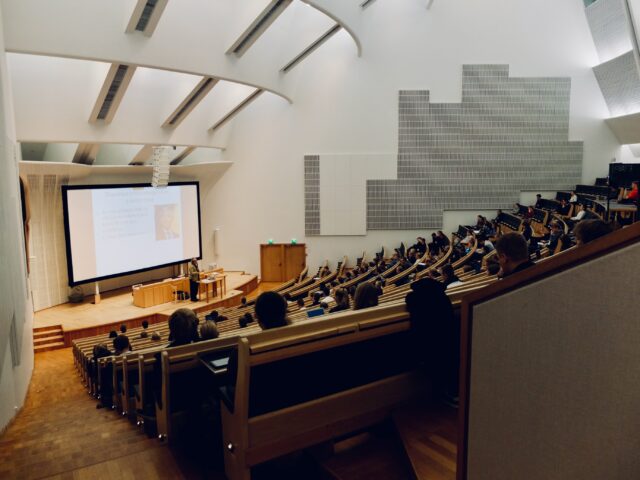Suncrest College—the result of a merger between two colleges in Saskatchewan—officially stepped into its new identity this week. Boasting the new tagline “Bright minds. Bright futures.” the college shared that it will launch its website, social media channels, and branded materials and signage over the coming months. The college will operate across 11 campuses with 280 staff and will continue to offer high school upgrading, skills training diplomas and certificates, trades training, university degrees, employability programs, safety training, and corporate/professional development.

Top Ten News
July 6, 2023
In the wake of the recent attack at the University of Waterloo, many in the postsecondary sector are calling for sustained change in and beyond the sector. CBC reports that postsecondary staff and students in Alberta are also calling for tangible and sustained changes from their institutional leaders to prevent a similar incident from occurring. UWaterloo associate professors Shana MacDonald and Alysia Kolentsis penned an article on the danger of polarizing rhetoric about gender and the transformative power of university classrooms. In another editorial, URegina Assistant Professor j wallace skelton calls for a broader culture shift and touches on the role of universities in protecting at-risk staff, faculty, and students. “If we only blame the attacker, we fail again because this is not an isolated incident,” writes skelton, noting the need for a broad response from society and universities alike.
St Thomas University has received $2M from Irving Oil and the Arthur L Irving Family Foundation. The gift was made in recognition of outgoing STU President Dawn Russell’s contributions to the university and will be used to establish full-tuition renewable entrance scholarships. The inaugural three Arthur L Irving Family Scholars will receive this funding in Fall 2024; once the endowment is fully mature, these scholarships will fund 12 students annually. STU VP Academic and Research Dr Kim Fenwick communicated her gratitude for the gift and acknowledged “the support for generations of students as a tribute to the leadership of Dawn Russell” and the donors’ belief in the “excellence in education at St Thomas University and in New Brunswick.”
The University of Regina has announced new partnership agreements with Collège Mathieu and Northlands College, with the goal of expanding education access. This summer, URegina’s La Cité universitaire francophone and Mathieu will sign a Memorandum of Understanding focused on expanding French education in the province. Under this MOU, the two institutions will establish a dual accreditation system for secondary and postsecondary education and co-develop complementary college and university French education programs. URegina and Northlands also recently signed a Memorandum of Agreement to expand access to higher education in Northern Saskatchewan. “This agreement enables students in northern Saskatchewan to take University of Regina courses and programs without having to leave their home communities,” said URegina President Dr Jeff Keshen.
Postsecondary institutions are uniquely positioned to develop and deliver microcredentials that respond to the learner and industry needs of both today and tomorrow, argues Janine Janosky (City Colleges of Chicago) for the evoLLLution. Janosky subsequently provides seven key considerations for institutions looking to establish microcredential programs. She states that postsecondary institutions should research market demands, engage with businesses and industry experts, and leverage technology in order to ensure their microcredential programming directly responds to employers’ needs. These programs should also be designed with clearly defined learning outcomes, competency-based assessments, and flexibility at their core. Finally, she asserts that the value-add of these microcredentials must be effectively communicated to learners, businesses, employers, and communities.
Brock University’s Parking Services has announced that it will roll out a series of changes over the next few months. In particular, the university will eliminate paper permits and hangtags as it implements License Plate Recognition technology, which will use a vehicle’s license plate as a parking permit. The university will also launch a shared Parking Services and Campus Safety Services desk; introduce new wayfinding signage and changes to the lots; and create a new Parking Services website with updated information on parking options on campus, rules and regulations, guidance on the HONK app, and more.
The Université du Québec à Montréal’s Board of Governors recently adopted Politique no 2 sur la liberté académique universitaire, a university academic freedom policy, as required by the Government of Québec. The policy applies to any person who is engaged in activities that contribute to the mission of UQÀM and stipulates that these persons must recognize and advocate for academic freedom. This ensures that members of the UQÀM community can pursue teaching, research, and creation without doctrinal, ideological, or moral constraints. UQÀM Recteur Stéphane Pallage said that he hopes this policy will aid in the free flow of ideas and foster a diversity of viewpoints at the university.
Several universities have recently announced new research chairs. The University of New Brunswick has launched The Lockheed Martin Research Chair in Additive Manufacturing, which will be held by Dr Hamed Asgari for a five-year term. In this role, Asgari will research 3D-metal printing for marine applications. The chair leverages earlier funding provided by Lockheed Martin, as well as funding from the New Brunswick Innovation Foundation. The University of Saskatchewan has announced the new Strategic Research Program Chair in Spring Wheat and Canaryseed Breeding and Genetics, which will be held by Dr Adam Carter. York University named fifteen researchers as York Research Chairs, as part of an internal program that mirrors the Canada Research Chairs program. The research chairs will fill the role for a five-year term and will receive institutional support as they embark on projects.
Earlier this week, rescue personnel were dispatched to the University of Saskatchewan after receiving a 911 call reporting a partial roof collapse on campus. The crew rescued three construction workers, who had been conducting selective demolition work at USask’s Murray Library when the roof collapsed. The three workers sustained non-life-threatening injuries, for which they were transported to and received treatment from the hospital; other workers present on the scene were found safe. According to The Canadian Press, the incident is now under investigation by the province’s Occupational Health and Safety unit.
University of Victoria, University of British Columbia, and University of Northern British Columbia have received funding from the Pacific Institute for Climate Solution (PICS) to accelerate climate action. With this funding, two research teams from UVic will embark on climate-related projects in Victoria and in the ocean; two teams from UBC will explore how to use Indigenous wisdom to prevent wildfires and how to turn excess carbon into useable products; and a research team at UNBC will connect people in mountain communities with information on climate change adaptation. Each team will receive $180K over three years through PICS’ Opportunity Projects Program.
